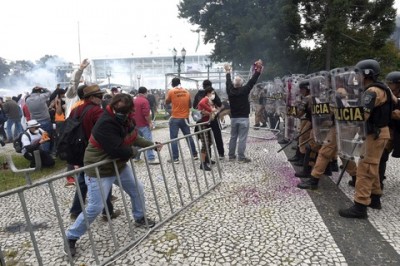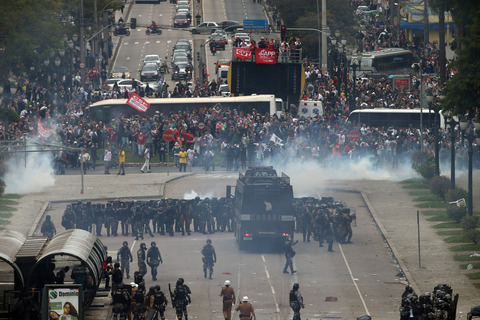Military Police Attack Brazilian Teachers, Leaving Over 200 Injured

Image: Police confront protesters
Over 200 striking teachers were injured in Brazil’s southern city of Curitiba Wednesday after militarized police used rubber bullets, tear gas, stun grenades, pepper spray and batons to prevent them from entering the Paraná state house to protest against a proposed attack on their pension rights.
The teachers, who launched an indefinite strike last Saturday, had faced continuous police attacks since setting up a tent camp outside the state legislative building on Monday. The repression escalated sharply on Wednesday, however, as the legislature prepared to vote on a bill backed by Governor Beto Richa that would radically alter the pension system for public employees.
The pension change is part of a series of austerity measures and tax cuts that are being implemented across Brazil at both the national level by Workers Party (Partido dos Trabalhadores-PT) President Dilma Rousseff and at the state level by governors like Richa of the right-wing PSDB.
The government center of Curitiba was described by many Wednesday as a war zone, with helmeted members of the Military Police and its BOPE special police operations battalion firing guns and helicopters overhead, dropping gas on the teachers and their supporters, who were said to number between 15,000 and 20,000. Armored cars were also deployed and a water cannon, originally procured for suppressing last year’s demonstrations against the World Cup, was turned against the teachers.
The striking teachers were met with overwhelming force when they attempted to push past police barricades and into the state legislature. Under Richa’s orders, some 2,000 Military Police had been deployed at the building to violently quell any such attempt.
Last February, a similar demonstration had succeeded in occupying the legislative chamber and halting a vote on an austerity package, which included the pension counter-reform. The authorities were determined to prevent any repeat of this action.
In the end the Legislative Assembly approved the amendments to the pension legislation by a vote of 31 to 20. The Richa administration has claimed that by forcing workers to contribute to their pensions and slashing state contributions, the legislation will reduce the state budget by more than US$41 million a month. The vote first had to be postponed because of tear gas in the hall. It was subsequently taken amid the sounds of gunfire and screams of the wounded from outside.
According to official figures released by the municipality of Curitiba, 213 people were injured in the police violence. Of these, at least 42 were taken to the hospital and eight were reported in serious condition.
Curitiba’s city hall was turned into a makeshift first aid center with teachers streaming in covered with blood from head wounds and suffering from other injuries, including dog bites.
The Order of Brazilian Lawyers, which sent observers to the demonstration, issued a statement denouncing the police violence. “The Military Police should act to guarantee the safety of the population, not to carry out the massacre” witnessed in Curitiba, it said.
The teachers’ struggle in Paraná is only one of many that have unfolded across Brazil in recent months, including in neighboring São Paulo, where a state teachers’ strike is already in its second month.
The war on teachers, which took on its most direct form in the streets of Curitiba, will only intensify as the PT national government of President Rousseff pushes through what she has described as “huge cuts” to the budget, including funding for education.
The strike in Paraná was forced upon the teachers union, the APP (Associação dos Professores do Paraná) over the opposition of the leadership, which tried to limit it to a one-day protest and to confine demands solely to the pension issue.
The teachers unions nationally, most of them affiliated to the CUT labor federation, have sought to limit the strikes and have kept them isolated one from the other.
The CUT is closely tied to the ruling PT and therefore works to subordinate the workers’ struggles to the Rousseff government. This government is implementing austerity measures and pushing through a new law on outsourcing which threatens to decimate the wages and social rights of wide layers of the Brazilian working class, even as it is engulfed in a massive corruption scandal surrounding the state-owned energy conglomerate Petrobras.
The deliberate suppression of workers’ struggles by the PT, the CUT and various pseudo-left groups which gravitate around them has allowed the Brazilian right to capitalize on the crisis of the Rousseff government, organizing mass demonstrations for impeachment and, in the case of some elements, a return to military dictatorship.
The violent confrontation in Curitiba, however, is indicative of the heating up of the class struggle in Brazil and the vast anger and opposition that exists within the working class toward the entire bourgeois political setup, from the PT to the extreme right.


